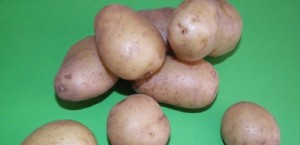
‘We should again valorise the entire potato.’ In one sentence, AVEBE’s ambition in the biobased economy. In order to realize this goal, the corporation has many ideas for opportunities in research. ‘More than we can finance. We will have to make choices.’ Say Bert Jansen and Marco Giuseppin, CEO and CTO respectively to AVEBE, the Northern Dutch potato farmers’ cooperative.
As a matter of fact, valorising the entire potato is a return to the past. In the nineteenth century, each component of the potato was valorised. There was no waste, cycles were closed. And the company marketed all its products. For instance, they processed waste streams to alcohol and sold that on the market.
Fringe activities closed down
That picture changed in the twentieth century, when small factories were scaled up and started to specialize. Jansen: ‘Alcohol, for instance. We could not compete on price with them.’ Fringe activities were closed down.
Jansen: ‘Until the early seventies we did not valorise potato proteins, they went down the drain. When the harvest was going on, canals and rivers were white with froth. When that was no longer allowed, we developed a process to boil the protein rich side stream, in order retrieve proteins which were sold as fodder. But that process is energy intensive. Now we developed an innovative method to isolate proteins at room temperature from process water, almost without any energy use. Incidentally, that process produces higher-value proteins, applicable in sports drinks, cosmetics and pharmaceuticals. It provides us with a nice entry into the trend of animal to vegetal proteins.’
Giuseppin: ‘Our fibre valorisation program is quite similar. We can return fibres to the land, but that carries the least profit. Now we can improve food (e.g. ketchup) structure using potato fibre.’
Search for valorisation
But AVEBE has more ambitions. Therefore, it joined the Dutch Biorefinery Cluster. Giuseppin: ‘Together, we investigate new technologies. For instance, energy extensive drying technologies, or technologies for waste water fermentation and biogas production. More generally, we look for technologies to valorise small amounts of ingredients of waste water. For instance, the potato contains substances which lower the blood pressure. And health enhancing peptides. But as yet, no one has come up with a technology for cost-effective retrieval of such substances.’
Joint ventures
Jansen expects that these investigations will result in joint ventures with other companies. ‘We will have to make choices. Potato waste water contains an awful lot of ingredients. Albeit in low concentrations. As a matter of fact, we have more ideas on promising programs than we can finance.’
‘In ten years’ time we will have closed production cycles and will not need waste water treatment any more. We will use much less energy and water, and will retrieve much more stuff from process water.’ To valorise the entire potato, as a matter of fact that is the principle of the biobased economy.
Courtesy Dutch Biorefinery Cluster
